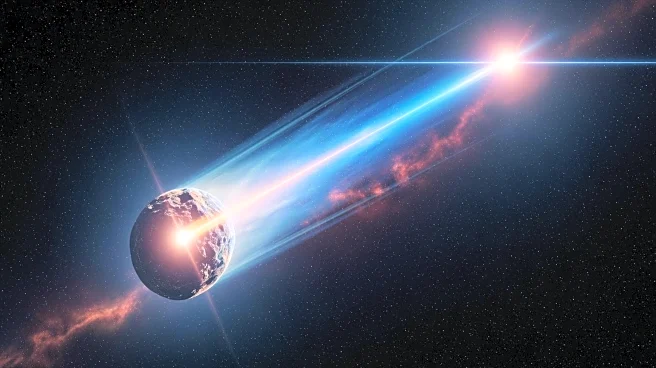What's Happening?
Avi Loeb, a prominent astronomer, has been studying the interstellar object 3I/ATLAS, which has displayed unusual characteristics. Recent observations from the Two-meter Twin Telescope in the Canary Islands
revealed a faint jet pointing towards the Sun, contrary to typical comet behavior where tails point away due to solar radiation and wind. This anomaly, termed an 'anti-tail,' raises questions about the nature of 3I/ATLAS. Loeb, along with Eric Keto, is exploring the physics behind this phenomenon, challenging the conventional classification of 3I/ATLAS as a comet. The object also exhibits other peculiarities, such as extreme negative polarization and a gas plume with a high nickel-to-cyanide ratio, which are unprecedented among known comets.
Why It's Important?
The study of 3I/ATLAS is significant as it challenges existing cometary models and could reshape our understanding of interstellar objects. If 3I/ATLAS is not a typical comet, it may provide insights into the composition and behavior of objects from outside our solar system. This could have implications for astronomy and astrophysics, potentially influencing theories about the formation and evolution of celestial bodies. The findings may also impact future space missions and the search for extraterrestrial life, as understanding these anomalies could refine detection methods for interstellar objects.
What's Next?
Loeb and Keto are preparing a follow-up paper to delve deeper into the physics of the sunward jet. The object is expected to pass within 8 million kilometers of the Europa Clipper and Hera spacecraft, offering a potential opportunity for further observation. However, Loeb calculates that the gas plume may be swept away by solar wind before reaching these spacecraft. The scientific community may need to reassess the classification of 3I/ATLAS, and historians of science might explore why some experts have overlooked its anomalies.
Beyond the Headlines
The investigation into 3I/ATLAS raises broader questions about scientific bias and the interpretation of anomalous data. Loeb suggests that the history of science may be influenced by who writes it, and warns against AI systems being biased by myths rather than facts. This highlights the importance of maintaining objectivity and openness to new evidence in scientific research, which could lead to paradigm shifts in our understanding of the universe.








